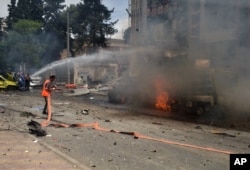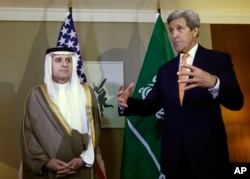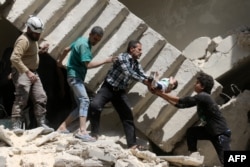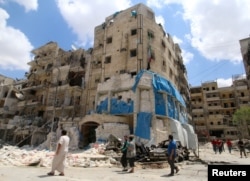A team led by the United States, Russia and the United Nations is working to finalize a plan that could restore the cessation of hostilities in Syria, where fighting between the government and rebels could unhinge a multinational effort to fight the Islamic State.
“Our teams, on a military-to-military basis, are working through the details that need to be implemented so that this can be restored,” said Secretary of State John Kerry.
He commented Tuesday, a day after holding emergency talks in Geneva with U.N. Special Envoy for Syria Staffan de Mistura and other officials.
Kerry also spoke by phone to Russian Foreign Minister Sergei Lavrov. The U.S. and Russia are co-chairs of a Syrian cease-fire task force.
Earlier Tuesday, Lavrov told reporters he was hopeful that a truce could be agreed to “in the nearest future, even in the coming hours.” He commented as he met with de Mistura in Moscow.
The flurry of meetings came after a cease-fire, announced by world powers in February, began unraveling, especially in Aleppo, Syria’s largest city.
Since late April, more than 270 people have died as a result of fighting in the city, including more than 50 who were killed in a Thursday airstrike on a hospital blamed on the regime.
“We are particularly aiming to try to restore this [cease-fire] in Aleppo,” Kerry said.
He did not spell out details of the plan being discussed by negotiators in Geneva but did indicate there could be consequences for Syrian President Bashar al-Assad if he did not comply.
“If Assad does not adhere to this, there will clearly be repercussions, and one of them may be the total destruction of the cease-fire and they go back to war,” Kerry said. “I do not think that Russia wants that. I don’t think that Assad is going to benefit from that, but there may be other repercussions that are being discussed.”
Lavrov said he urged U.S. officials to put pressure on moderate rebels to leave territories occupied by Islamic State fighters and al-Nusra Front jihadists.
Test of US commitment
The battle for Aleppo is key at a time when the conflict has become a test of U.S. commitment in the region.
“The security situation there, as bad as it has been for some time, now is deteriorating,” White House spokesman Josh Earnest said Tuesday. “It is an indication that the cessation of hostilities is continuing to fray.”
He spoke after a series of rockets, believed to have been launched by rebels, hit a hospital and other buildings the city, killing at last 16 people.
Kerry said there was no justification for “horrific violence” targeting civilians. “We condemn any of these attacks, no matter who commits them.”
Jasmine Gani, an analyst at the Center for Syrian Studies at the University of St. Andrews in Scotland, told VOA that perceptions of U.S. legitimacy in the region hang in the balance as a result of what she called a "mismatched rhetoric and policy." She said Washington raised expectations by calling for Assad's exit early in the conflict and then failed to provide the support needed to carry out that aim.
With Russia now figuring strongly in the equation, Gani said, the U.S. "has to be a lot more careful as to what it puts its commitment to. In the past, it was not such a problem, but the shift of dynamics in global power means there is greater scrutiny on the United States to fulfill its promises."
VOA's Luis Ramirez and Ken Bredemeier contributed to this report.








